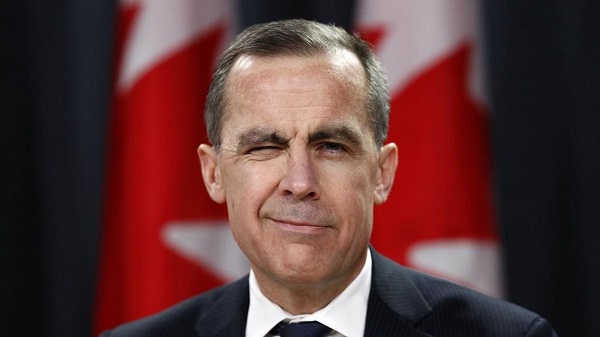Business
Carney can rescue health care by loosening restrictions of the Canada Health Act

From the Fraser Institute
Although rubber has yet to meet road, Prime Minister Mark Carney is vowing to reverse many of the policy failures of previous administrations. His government plans to greatly increase defence spending, streamline the infrastructure approval process, and reduce provincial non-tariff barriers.
But while the government is right to focus on these measures, which aim to counter President Donald Trump’s tariff and annexationist threats, it’s easy to forget that Canada faced serious challenges long before The Donald arrived in the White House for his first term, let alone for his second.
First among these challenges is the crisis in health care. Six-and-a-half million Canadians lack a family doctor. Emergency room wait times can stretch on hour after hour. Prince Edward Island is the worst, with a median wait time of almost three hours before a patient first sees a physician. People in Ontario often have to wait months for an MRI scan. Some people travel to Buffalo where clinics offer to provide the service in a matter of days.
The median wait time between referral by a family doctor to treatment by a specialist in 2024 reached 30 weeks, the longest gap ever and more than three times the median wait in 1993, according to a study published by the Fraser Institute. In category after category, provincial health-care systems struggle to meet the standards they set for themselves.
If Carney really wanted to be remembered as a transformative prime minister, he would tackle this crisis by loosening the restrictions of the Canada Health Act.
The Act, and other laws and regulations banning user fees and extra billing, effectively prohibit provincial governments from permitting private health insurance to supplement public insurance for essential services. This has prevented the provinces from developing the sorts of private-sector safety valves used in developed countries around the world that also have universal health-care systems.
For instance, another report shows that Swiss citizens are able to choose among dozens of competing private-sector insurance plans that allow access to medically essential and publicly funded services. While there are copayments, public programs help lower-income patients to offset the costs.
In Australia, citizens are required to obtain private health insurance to supplement public coverage. That insurance, according to a federal government website, permits patients to receive “treatment in public or private hospitals as a private patient with the doctor of your choice” along with “health services that are not covered under Medicare such as physiotherapy, dental and optical.” Citizens who don’t obtain private insurance must pay a hefty Medicare Levy Surcharge of up to 1.5 per cent of taxable income. There are programs to offset the surcharge for low-income citizens.
In the Netherlands, to offer just one more example, the federal government also pays private health insurers to provide basic care, while allowing citizens who wish to pay for supplemental insurance.
Canadians pay a high price for the lack of private-sector insurance. According to the annual report comparing universal health-care countries published by the Fraser Institute, in 2023, 65.2 per cent of Canadians polled reported waiting more than one month for an appointment with a specialist compared to 51.9 per cent in Australia, 36.3 per cent in Switzerland and 35.7 per cent in the Netherlands.
The Commonwealth Fund, an U.S. non-profit health-care think-tank, ranked Canada seventh, in a study of how well 10 developed countries delivered health care. Australia ranked first.
A 2024 study ranked countries by how well they delivered various services. In that survey, the Netherlands came in 18th in the category of physicians per capita. Australia ranked seventh. Switzerland ranked sixth. Canada ranked 28th.
And yet, it terms of health-care spending as a share of GDP, Canada ranked fourth, Australia ninth and the Netherlands 13th. Switzerland came in at number two.
There is, in other words, little correlation between spending on health care and the health of the system. There is, however, strong evidence that countries offering universal public care—supplemented by private-sector alternatives—do better than Canada.
Mark Carney could go down in history as the prime minister who rescued Canada’s health-care system. Loosening the restrictions of the Canada Health Act to permit supplemental private plans for essential care in provinces that choose to adopt them, and reforming other troubling aspects of the Act, would set the stage for real innovation, experimentation and reform by the provinces.
Based on the evidence of jurisdictions from Sweden to Singapore, the first provinces to open the door to private insurance and related reforms would quickly see improvements in wait times and other metrics. Other provinces would likely soon follow.
Business
PM Carney’s Astounding Conflicts Are Clearly Exposed. What Will Parliament, The Media, And Voters Do About It?

Will opposition parties force an election? Will the media demand Carney account for his conflicts? Will voters continue to allow Carney and Brookfield to profit from Carney’s leadership as they condemn the US President for doing the same?
NEWS ALERT!!!! https://t.co/HrhXGCyfPq
— Andrew Scheer (@AndrewScheer) October 1, 2025
From Conservative Party Communications
Conservative members of the Ethics Committee released the following statement on its ongoing investigation into Prime Minister Mark Carney’s conflicts of interest:
“Yesterday, the Ethics Committee heard scathing testimony from Canada’s leading ethics and accountability experts on the façade that is Mark Carney’s so-called blind trust – and his conflict of interest screen which is nothing more than a smokescreen.
“Leading ethics and conflict of interest experts told MPs that these measures are entirely insufficient, and that Prime Minister Carney stands to make millions from his investments while keeping them largely hidden from Canadians. The breadth of Carney’s conflicts and potential to benefit financially are entirely unprecedented in federal Canadian politics.
“Carney was involved in structuring Brookfield’s Global Transition Funds, from which he is set to receive carried interest payments potentially worth tens of millions of dollars. Carney knows exactly what assets are in these funds, but he has refused to disclose them. If the funds make money, he makes money – and the decisions he makes as Prime Minister will impact their value.
“Democracy Watch founder Duff Conacher testified that the Conflict of Interest Act allows Carney to ‘secretly profit’ from ‘secret investments’ – dismissing blind trusts as ‘not blind at all’ – and confirmed that Carney knows exactly what is in his blind trust. It is only the public that is blind to the full extent of the Prime Minister’s holdings.
“As currently written, the Act allows the Prime Minister to participate in ‘99% of the decisions’ that impact his private investments. Conacher considers the legislation a ‘sad joke’ – noting that ‘any time [Carney] is making a decision that affects businesses in Canada, he is in a financial conflict of interest.’
“As York University’s Dr. Ian Steadman told the Committee, blind trusts simply ‘aren’t enough’ to prevent public office holders from advancing their personal financial interests.
“Witnesses also slammed the Prime Minister’s conflict of interest screen. The screen is enforced by Carney’s top two aides who serve at his pleasure and are not independent. It lacks any transparency or oversight mechanism, which Conacher noted is a violation of the Act.
“The Ethics Commissioner has the power to strengthen the ethics screen and enforce full transparency today. He has failed to do so. This is deeply troubling, and must be addressed.
“These revelations are just the tip of the iceberg in an ongoing investigation. Conservatives will continue to expose Mark Carney’s unprecedented conflicts of interests and fight to close the loopholes in the Act that the Prime Minister is taking advantage of.”
Alberta
Ottawa’s Firearms Buyback Plan: Federal Government Puts Provincial Authority In Its Sights

From the Frontier Centre for Public Policy
It’s about politics and provinces are right to refuse to play along
Federal Public Safety Minister Gary Anandasangaree’s leaked admission that Ottawa’s firearms buyback is unenforceable was no slip. It exposed the way federal power is deployed for partisan gain while provinces are left to pay the bill.
The leak matters because it exposes a pattern, not an exception. Ottawa drafts policies to suit its politics and expects provinces to carry the weight. Police budgets, university research chairs, hospital systems and housing markets are treated as levers to be pulled from Ottawa. The effects are felt locally, but the decisions are made elsewhere.
Consider the pattern. The Online Harms Act, rejected more than once, is introduced yet again, as if repetition can substitute for consent. Health care dollars are tied to federal strings that reorder provincial systems with no regard for local capacity. Immigration quotas climb at a pace provinces cannot house or school. Environmental rules descend without negotiation, upending years of co-operative planning. Each measure arrives as an edict. Consultation is reduced to announcement.
Resistance has already begun. Saskatchewan moved early, adopting legislation that makes any federal confiscation program subject to provincial authority, including RCMP operations. In Alberta, Premier Danielle Smith has gone further, declaring flatly: “We will not allow police in Alberta to confiscate previously legal firearms. I have directed two of my ministers to relentlessly defend Albertans’ right to lawful and safe possession of firearms and the right to self-defence.”
Even before the introduction of the Sovereignty Act, Tyler Shandro, then Alberta’s justice minister, announced that the province would not use its police or prosecutors to carry out confiscations. Although former premier Jason Kenney opposed a Sovereignty Act, his government likewise refused to act as Ottawa’s enforcer.
Alberta and Saskatchewan have since given themselves legislative tools, Sovereignty Acts, which assert the right of provinces to decline enforcement of federal laws they judge unconstitutional. These statutes formalize existing constitutional powers. Provinces without Sovereignty Acts have also drawn lines. Ontario has signalled its refusal to help enforce Ottawa’s firearms program.
These positions are lawful, rooted in the Constitution’s division of powers, which assigns the administration of justice and policing to the provinces.
This clarity ought to attract others. Manitoba, with one of the highest proportions of licensed hunters in the country, has strong reason to resist Ottawa’s targeting of lawful gun owners. Communities are not made safer by seizing deer rifles from responsible hunters, nor are public services improved by diverting scarce provincial resources into a program that federal ministers concede will not work. Manitoba would do well to follow Alberta and Saskatchewan in defending its jurisdiction, whether through a Sovereignty Act or by refusing to play Ottawa’s game.
The point is practical. Prairie provinces cannot spare rural detachments to seize hunters’ rifles because the Liberal caucus fears losing seats in Montreal. They cannot put their power grids at risk to meet Ottawa’s timelines while households absorb higher bills. Universities cannot be turned into federal policy pilot projects. Provinces exist to govern their own communities, not to absorb the fallout of federal experiments.
The genius of federalism lies in the division of authority, which encourages compromise and minimizes tyrannical imposition. Ottawa governs in its sphere, provinces in theirs. Where the two overlap, cooperation must be negotiated, not imposed. Sovereignty Acts sharpen that principle. They remind Ottawa that partnership is earned, not dictated.
What Anandasangaree’s admission exposed was not only the cynicism of one firearms program. It revealed a method of governing: federal power deployed for partisan gain, with provinces reduced to instruments. That cannot endure. Canada was never meant to be a chain of command. It was built as a contract—one that requires respect for provincial authority.
Provinces that refuse to carry out Ottawa’s politically motivated projects are not weakening Canada; they are enforcing its terms.
Marco Navarro-Genie is vice-president of research at the Frontier Centre for Public Policy and co-author, with Barry Cooper, of Canada’s COVID: The Story of a Pandemic Moral Panic (2023).
-

 Alberta1 day ago
Alberta1 day agoWith no company willing to spearhead a new pipeline under federal restrictions, Alberta takes the lead
-

 National2 days ago
National2 days agoCanada’s birth rate plummets to an all-time low
-

 espionage2 days ago
espionage2 days agoNorth Americans are becoming numb to surveillance.
-

 Alberta24 hours ago
Alberta24 hours agoHalfway River First Nation makes history with Montney natural gas development deal
-

 Crime2 days ago
Crime2 days agoPierre Poilievre says Christians may be ‘number one’ target of hate violence in Canada
-

 Business1 day ago
Business1 day agoElon Musk announces ‘Grokipedia’ project after Tucker Carlson highlights Wikipedia bias
-

 Bruce Dowbiggin1 day ago
Bruce Dowbiggin1 day agoThe McDavid Dilemma: Edmonton Faces Another Big Mess
-

 Alberta1 day ago
Alberta1 day agoTaxpayers: Alberta must scrap its industrial carbon tax




